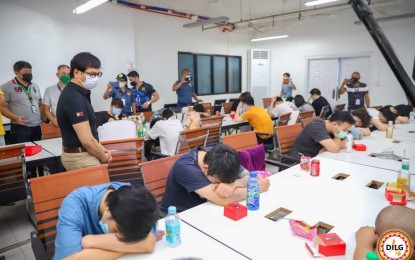
(File photo courtesy of DILG)
MANILA – Surigao del Norte Rep. Robert Ace Barbers on Tuesday called on the government to heed lawmakers' call to ban the operations of Philippine Offshore Gaming Operators (POGOs), saying the moral damage it inflicts on society far outweighs the purported benefits derived from the online gambling firms.
In a statement, Barbers said most POGO franchises seemingly became the root of evil that brought into the country vices and crimes, such as “kidnap-for-ransom”, prostitution, murder, extortion, illegal drugs activities, money laundering, human trafficking, graft and corruption, online scamming, and many others.
Barbers, chairperson of the House of Representatives Committee on Dangerous Drugs, also said it is of public knowledge that in China, the home of POGO workers, online gaming or gambling, in any form, is banned or outlawed as their schemes also victimize their fellow nationals.
“Reports also indicate that POGO firms, aside from gambling-related crimes they created, have also imported prostitutes that caters only to thousands of POGO workers and other foreign nationals. Payag ba tayo na mag-import ng tao at kumpanya na gumagawa ng mga illegal na bagay, at gawing legal ang illegal sa ating bansa kapalit ng pera? (Are we fine with importing people and firms that do illegal activities and make these legal here just for money?)” he asked.
Barbers said at least 300,000 Chinese tourists have entered the country since 2016 and almost all of them ended up as POGO workers, with some allegedly being ordered to do dirty work, such as online scamming like phishing, e-mail spoofing, extortion, and other forms of cybercrime.
The lawmaker said the much-ballyhooed claim by the Philippine Amusement and Gaming Corp. (PAGCOR) that POGO operations would provide at least PHP32 billion annually in much-needed tax revenues is a complete disappointment or total failure from start to present.
Based on reports, the taxes collected by the Bureau of Internal Revenue from POGOs and their service providers went down by 46 percent from PHP7.1 billion in 2020 to PHP3.19 billion as of present.
The Mindanao solon added the loosely-regulated influx of a large number of Chinese tourists-turned POGO workers in the country is now creating a nightmare for immigration and law enforcement authorities because many of them are overstaying, with expired visas and work permits, among other violations.
Of the more than 300,000 Chinese tourists-turned-POGO-workers, Barbers noted that concerned government agencies, as of this writing, could not provide clear details on their actual whereabouts, how many have expired visas and are overstaying, those who have or have not been given work permits, and the number of those who have already left the country.
Barbers said the data provided by PAGCOR showed there were 32 POGOs and 127 service providers allowed to operate in the country, but some of these online-gambling firms are granting illegal sub-licenses to unknown or unregistered firms, through which Chinese and other nationals from Vietnam, Malaysia, Myanmar, among other countries, were subjected to human trafficking.
On the issue that the Supreme Court declared as unconstitutional the “double taxation” imposed on POGOs under Republic Act (RA) 11492 or the Bayanihan to Recover As One Act (Bayanihan 2) and RA 11590 or the amended National Internal Revenue Code, Barbers said the issue could be considered moot as it had been "overtaken by events."
The Bayanihan 2 Act was enacted into law in September 2020 and expired in December 2020, giving it a three-month existence, the taxation power of which was promptly contested by POGO firms for alleged double taxation. RA 11590 was enacted also in September 2020 and is still in effect today.
The SC declared as unconstitutional the imposition of a 5 percent franchise tax, value-added tax, and other applicable taxes on income from non-gaming operations earned by POGO operators, agents, service providers, and support providers before the enactment of RA 11590 in September 2020.
“The real question here is if the authorized or existing POGO firms and their hundreds of sub-licensees are truthfully paying the right amount of taxes that they and PAGCOR promised to deliver to the government,” Barbers said. (PNA)
